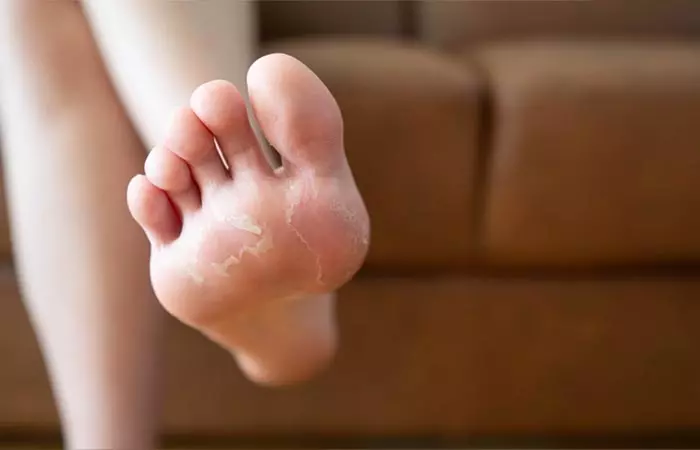This bitter-tasting, brownish natural oil may improve your skin texture and fight against bacteria. But how does neem oil actually work? Is it safe to use on the skin? How do you use it? This article will answer all your queries related to neem oil, its benefits, how to use it, safety, properties, and more. Keep reading to know everything about neem oil.
Benefits Of Neem Oil For Skin
There are multiple well-known benefits of neem that you can avail through its various forms, be it powder, paste, tea, oil, or as an ingredient in a commercial product. Here we are going to discuss how neem as an oil can be beneficial in your everyday life. Whether you need a natural remedy for medicinal baths or treating dandruff, neem oil has been used in a wide range of natural remedies for skin and hair. Learn about these benefits in more details below. What Are Its Benefits? It may treat acne, reduce dryness, and treat fungal infections and other skin conditions like eczema. Who Can Use It? Anyone can use it except for people with sensitive and acne-prone skin. How Often? You can apply a few drops of neem oil with another carrier oil daily. Caution Avoid using neem oil if you experience any rashes or redness on your skin.
1. Treats Acne
Neem seed oil has antibacterial and anti-inflammatory properties, making it a natural remedy for acne (1). A study showed that using neem oil for acne treatment can actually treat and prevent breakouts in the long run (2). Just apply neem oil as a spot treatment or all over your face or consider using an overnight neem face pack to treat acne. Ekta, a beauty and fashion blogger, shares how she uses neem oil to treat acne and acne scars: “In undiluted form, I use it directly on my acne or acne scars by taking a few drops on cotton and then dabbing it….I do this in my PM routine after cleansing and moisturizing. Trust me, it helps a lot in drying the acne, and you will also notice slight lightening of the scars (i).”
2. Reduces Skin Dryness
Well-hydrated skin is less prone to damage. Neem oil contains essential fatty acids like linoleic acid, palmitic acid, oleic acid, and stearic acid (3). These acids can strengthen the skin’s barrier and keep it moisturized.
3. Fights Skin Damage
Neem oil also has antioxidant properties that protect the skin from environmental damage. A study found that neem oil comprises nimbolide and azadirachtin (4). These components combat the skin damage caused by free radicals and can improve the overall skin texture.
4. Eliminates Fungal Infections
You can also use neem oil for treating skin fungi since it contains fungicidal compounds called gedunin and nimbidol (1). This oil is used in Ayurveda to treat Ayurvedic fungal skin conditions such as athlete’s foot and ringworm, due to its antifungal properties (5).
5. Treats Eczema And Other Skin Conditions
Nimbidin, one of the primary components of the neem plant which can help to manage and treat skin infections. Thus, topical application of neem for eczema can soothe inflammation and heal microtears. It’s also great for other skin conditions like dermatitis and furunculosis (6). Some sources claim that it can also treat psoriasis and provide relief from boils and ulcers (5). That said, more research is needed to back these claims.
6. Heals Wounds
Neem oil has been traditionally used in some cultures for its potential medicinal properties, including wound healing. It contains various compounds, such as triglycerides, nimbidin, nimbin, and other bioactive components with antimicrobial, anti-inflammatory, and antioxidant properties. A study conducted to understand the efficacy of the topical application of neem oil showed that it was effective against chronic non-healing wounds (7).
7. Fights The Signs Of Aging
Neem leaves possess anti-aging properties due to being rich in antioxidants, fatty acids, and vitamins. These components help combat free radicals, which can cause premature aging of the skin (8). Neem oil, extracted from the leaves, moisturizes and nourishes the skin, promoting elasticity and reducing the appearance of fine lines and wrinkles. As mentioned earlier, it also has anti-inflammatory qualities, which soothe irritated skin. Thus, regular use of neem oil in skin care routines may contribute to a more youthful skin tone by maintaining skin health and preventing the signs of aging. From the various neem oil benefits and applications for the skin, it is clear that adding this Ayurvedic oil to your skin care regimen is a good idea. However, neem oil needs to be used safely and in the correct manner. Otherwise, you may end up doing more harm to your skin than good. Read on to learn how to apply neem oil to your skin.
How To Use Neem Oil On Your Skin
Neem oil must be applied only after you have carried out a small patch test on your arm to check how your skin reacts to it. Apply a small amount on the inside of your forearm. If you do not experience any adverse reaction like redness or irritation in 24 hours, it is considered safe for skin application. It must be noted that neem oil in itself is a very potent essential oil. It is best used by mixing it in equal parts with a carrier oil like coconut, jojoba, or olive oil. Adding it to a carrier oil will also give you the added advantage of a slightly subdued neem oil smell that many people find repulsive. You can also add a few drops of other pleasant-smelling oils like lavender, rose, jasmine, etc., for a relaxing and soothing effect. If you have oily skin that gets irritated by skin oils, mix a few drops of neem oil with natural aloe vera gel for a less oily effect. Once you have mixed it with a carrier oil or gel, follow these steps to use neem oil on your face and body: While there are many benefits of neem seed oil for the skin and hair, you must also be aware of the risks associated with it. Keep reading to find out more.
Risks Of Neem Oil For Skin
Here are the risks associated with neem oil that you must keep in mind before application:
Neem oil is toxic and must never be consumed. Oral consumption of excessive neem oil can lead to toxicity and poisoning with symptoms like vomiting, seizures, excessive acid in the body, and brain malfunction (9). Neem oil is a very potent oil that can cause unwanted reactions in people with sensitive skin, including itchiness, redness, rash, or hives. If you notice any of these signs, stop using it immediately and consult a doctor. Neem oil is not suitable for children due to its high potency. It can also cause severe reactions in infants like toxic encephalopathy (10). Thus, it should not be used on a child unless prescribed by a doctor. It is also uncertain if neem oil is safe for pregnant and breastfeeding women since not many studies have been conducted in this regard. Always consult your doctor before applying it to your face or body.
Since it can cause some dangerous side effects, it is always recommended to talk to your healthcare provider before using it to avoid any health risks. As the popularity of neem oil has grown, many skin care enthusiasts are interested to learn whether it can be used at night. Continue reading to find out if this natural oil deserves a spot in your nighttime routine.
Can You Apply Neem Oil On Your Face At Night?
Yes, you can use neem oil on your face at night. Here’s how: Be careful not to leave this oil overnight on your face. Use pure neem oil for the face regularly for clearer skin. Does neem oil help dark circles? Yes, neem oil may possess anti-tanning properties that may help reduce pigmentation around the eyes (11). However, be cautious with its use as potent products may also cause leukoderma (white depigmented skin caused due to the absence of melanin producing cells) in certain individuals, (12). How long does neem oil take to work? It may take between a few days to a few weeks before you see any results. Conduct a patch test to check for adverse effects before using it. Is Neem also used as an insect repellent? Many traditional households use neem oil to repel mosquitos and other insects (13). However, more scientific study is required to validate the claim. Is neem oil safe for humans to eat? No, neem oil is not safe for human consumption. It may be toxic and can harm vital organs like kidneys and liver. It is meant for topical use only.
Illustration: Benefits Of Neem Oil For Skin How To Use It And Risk Factors
Discover 10 amazing beauty uses of neem oil! From treating acne to promoting hair growth and reducing frizz, neem oil can help you look and feel your best. Watch the video below and learn how to use it for dark spots, blackheads, and more!












